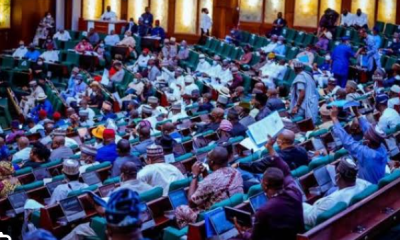News
Panic as over 5000 hospitalised in UK diagnosed with flu as NHS laments

By Kayode Sanni-Arewa
Latest data shows there were 5,000 patients with the virus being treated in hospital at the end of last week – almost 3.5 times higher than the same week in 2023, although not as high as in 2022.
The head of the Royal College of Emergency Medicine told the BBC that pressure on hospitals is “unacceptably awful” and flu is pushing them to breaking point.
It comes as health officials warn about the impact of the very cold weather expected this weekend on vulnerable patients, and the health system.
Prof Julian Redhead, NHS national clinical director for urgent and emergency care, said the figures show “the pressure from flu was nowhere near letting up before we headed into the new year, skyrocketing to over 5,000 cases a day in hospital as of the end of last week and rising at a very concerning rate”.
“With what looks like an extreme cold snap expected right across England ahead of the weekend, we know the low temperatures can be dangerous for those who are vulnerable or have respiratory conditions,” he added.
Prof Redhead says people at risk should try to keep warm and make sure they are stocked up on any regular medication.
It is not unusual to see an increase in flu during winter. The UK Health Security Agency says “this was anticipated” and that is why it has been urging those eligible to have a free flu vaccine, particularly health and social care workers.
Some 33% of pregnant women, 37% of people in an at-risk group and 73% of over-65s have had the jab, according to the latest vaccination figures.
‘Lack of beds’
Hospitals have put extra beds in place this year to help deal with the pressure on admissions created by flu and other winter viruses, including Covid and norovirus (the winter vomiting bug).
NHS chiefs say they have also added more support for people who frequently need emergency services, with more care being delivered outside hospitals.
Matthew Taylor, chief executive of the NHS Confederation, said the NHS had done “all it could” in advance to reduce risk to patients, but the service remained in a position of “national vulnerability” with “intense pressures” starting to impact local services.
Figures for last week show some 12,200 patients were left waiting in ambulances for more than an hour before they could be cared for in hospital.
Dr Adrian Boyle, head of the Royal College of Emergency Medicine, told BBC Radio 4’s Today programme that it was a very difficult time for both patients and staff.
“What we are seeing is ambulances are frequently stuck outside emergency departments, and our emergency departments are full.”
He said there was “an enormous amount of avoidable harm – excess deaths that shouldn’t be happening”.
Flu is the straw that is breaking the camel’s back – because we have this chronic lack of beds within our hospitals, and we don’t use those beds properly because we haven’t reformed social care,” he added.
His criticism comes on the day the health and social care secretary set out plans for reforming adult social care in England, although they are unlikely to be delivered before 2028 at the earliest.
A number of hospitals across different regions in England have restricted visits and asked patients and visitors to wear face masks to prevent further spread of flu.
In Scotland, there has also been a large rise in the number of people in hospital with flu. Earlier this week, First Minister John Swinney said the NHS was under “very significant pressures”.
A Welsh government spokesperson said there were continued “high levels of demand” on urgent and emergency care services this winter, and an increase in flu cases had added further pressure during the Christmas period.
What are flu symptoms?
Flu symptoms can progress very quickly and include:
a sudden high temperature
an aching body
feeling tired or exhausted
a dry cough
a sore throat
a headache
feeling, and being, sick
Children and adults are affected in a similar way.
Who is eligible for a free flu jab?
A free flu vaccine is available to those considered at higher risk of becoming seriously ill from flu during late autumn and early winter, including people:
aged 65 or over
with certain long-term health conditions
who are pregnant
who live in a care home
are the main carer for an elderly or disabled person, or receive a carer’s allowance
live with someone who has a weakened immune system
are a front-line health and social care worker
Children aged 2-3 and school-aged children are also offered a vaccine.
Anyone in eligible groups in England can book their vaccination through their GP surgery or local pharmacy, where available, or contact their employer if they are an NHS front-line worker.
People can also pay for vaccines privately at some pharmacies.
Why is flu so bad this year?
Flu creates problems every winter, being the season when viruses spread with ease, and can cause some to become very ill.
The severity of seasonal flu varies from year to year, depending on many factors, including which strains of the flu virus are most dominant and how many people are vaccinated against flu.
Why are some flu outbreaks so much worse than others?
A surge of flu appears to have hit earlier this winter than anticipated – in December, instead of January or February – with more people unwell and off work over the Christmas and New Year period, and some in need of hospital treatment.
People socialising with friends and family during the Christmas festivities will likely have added to the spread of the virus.
Health officials saw the flu wave coming, and have been urging people to take up the offer of a free flu vaccine for some time.
However, the number of people who have been vaccinated is lower than officials had hoped – just over a third of higher-risk adults have had the jab to date.
Several different strains of flu tend to circulate each winter, and the vaccine was created in advance to combat the current, predicted wave. According to health officials, the vaccine is doing its job.
Vaccines are particularly important in protecting against severe disease. Most people will recover from flu within a few weeks, but it can be serious, particularly if you have a long-term health condition or lower immunity.
Thousands of people die from flu-related illnesses each year.
News
Our members defecting to APC have ‘sins’ and are soliciting for forgiveness – Senator Abba Moro

Senate Minority Leader, Abba Moro, has said that soon people would understand the reason for mass defections from other political parties to the ruling All Progressives Congress (APC).
Recall there has been a gale of defections from the Peoples Democratic Party (PDP) to the APC.
Former presidential running mate of the PDP, Ifeanyi Okowa, Delta State Governor, Sheriff Oborevwori, and all PDP members in the House of Representatives from Delta State, defected to the APC.
Similarly, three PDP senators from Kebbi State defected to the APC.
In an interview with AIT’s ‘Focus Nigeria’, Moro said those party members who defected to the APC have sinned and are looking for forgiveness.
He said, “When history unfolds, we are going to have the privilege of knowing the main reasons why people are moving from PDP to the ruling party.
“It has always been the practice though, people don’t want to stay outside the corridors of power and so they quickly begin to realize that in the opposition, they won’t be getting as much as they want to get.
“Some of them who have been helmsmen at their various levels in the states, LGs, and Senate certainly have more reasons than Mets the eyes to moving to the ruling party.
“Don’t forget that a chieftain of the APC at one point said, if you move from your party to the APC, your sins are forgiven – so given the antecedents of some of the characters that are moving now – you can only conclude that they are only attesting to this assertion.
“They have sins and are looking for forgiveness, politically, these displaced persons may be going to the ruling party to ask for forgiveness, but is it in the interest of this country? Is it in the interest of democracy? Is it in the interest of the political development of this country that people continue to move from one political platform to the other?
“Where have principles taken flight to? Where has value taken flight to? You were elected on the platform of a political party and as the Supreme Court ruled, its political parties that people vote for, then you suddenly decide that you want to move to another political party which is predicated on the nebulous excuse that you are doing that in the interest of your constituency.”
News
INSECURITY! Ten killed in Plateau over attack linked to cattle rustling, farm destruction

No fewer than 10 people have been killed and several cows rustled in renewed violence in Riyom Local Government Area of Plateau State.
The recent escalation of violence in Riyom stems from farm destruction, cattle rustling, and attacks on livestock carried out by individuals from both Fulani and Berom communities.
According to a statement from Operation Safe Haven, the recent insecurity in the council area began on Monday, May 12, 2025, when suspected youths slaughtered and rustled cattle that had encroached on their farms in Dayan village, Riyom Local Government Area.
In retaliation, suspected Fulani herders attacked Danchindo village on the evening of May 13, killing four people before fleeing ahead of security operatives’ arrival.
On May 14, 26 cows were killed and several others injured in the Darwat community, allegedly in reprisal for the earlier killings of locals. Later that day, suspected Fulani militias retaliated by attacking an isolated settlement near the Wereng Kam community, killing six locals.
Upon receiving reports of rising tensions in Riyom, officers of the Joint Security Task Force engaged community representatives to broker peace and warned against actions that could further destabilise the fragile situation.
In response to allegations of cattle rustling and slaughtering, one suspect has been arrested and is currently under investigation, while 130 cows have been recovered and returned to their owners.
The statement added that the troops’ swift response prevented the assailants from completely burning down Wereng village. A mop-up operation was launched to neutralise fleeing militants, as troops continue to maintain a strong presence to restore order.
Major General Folusho Oyinlola, commander of Operation Safe Haven and General Officer Commanding 3 Division, visited the area and met with stakeholders and community leaders. Normalcy has returned, supported by the presence of security operatives working to maintain law and order.
This Riyom incident is coming four days after five traders who are residents of Dogon Ruwa community in Bashar district of Wase Local Government Area of Plateau State were abducted during a bandits’ attack on a market in the area.
The incident occurred on Monday morning, the market day, with an influx of traders and buyers from neighbouring communities conducting business activities.
According to residents who escaped the onslaught, the invaders came in large numbers on motorcycles at the peak of business transactions.
They shot sporadically as traders and residents scampered to safety, forcing people to flee the market and their homes.
In the past few months, hundreds of people have been killed and many more displaced after gunmen attacked several communities in the North-Central state.
In the wake of the renewed attacks, Governor Caleb Muftwang labelled them genocidal and an attempt at land grabbing.
News
Senate mulls terrorism charges for oil theft offenders

The Senate, yesterday, issued a stern warning that perpetrators of oil theft in the Niger Delta region may soon face terrorism charges and other stiffer penalties.
Senate President, Godswill Akpabio, disclosed this while declaring open a two-day public hearing on the “Incessant and nefarious acts of crude oil thefts in the Niger Delta and the actors held.”
The hearing organised by the Senate Ad-hoc Committee on Incessant Crude Oil Theft chaired by Ned Nwoko is aimed at addressing the persistent theft of crude oil in the Niger Delta and produce actionable solutions to the problem.
Akpabio, who was represented by his deputy, Barau Jibrin, said the 10th National Assembly would not stand idly by as the country loses billions of dollars annually to what he described as “brazen economic sabotage.”
He disclosed that the National Assembly was considering a range of strong legislative responses, including categorising major acts of oil theft as terrorism, mandatory digital metering for all oil production and exports, real-time monitoring, improved transparency in crude lifting and revenue reporting, as well as enhanced coordination among military, law enforcement, and anti-corruption agencies.
“Crude oil theft is not a victimless crime. It is directly responsible for economic instability, a weakened naira, underfunded critical sectors, and widespread poverty in oil-producing communities. It also finances illegal arms, fuels violence, and strengthens criminal networks.”
Akpabio lamented that despite past efforts, crude oil theft continues unabated due to systemic failures and gaps in enforcement and oversight. Recent reports estimate that Nigeria loses between 150,000 and 400,000 barrels of crude oil daily, costing the country billions in lost revenue.
“This public hearing must address critical questions: Who are the perpetrators? Are they militants, corrupt officials, international collaborators—or all three? Why have current security measures failed? And how are stolen shipments leaving the country undetected?” he asked.
The Senate President called on all stakeholders including regulatory agencies, oil companies, security forces and host communities, to work collaboratively to stop the looting of the country’s most valuable resource. He emphasised that oil companies must invest in surveillance technology and secure infrastructure, while host communities should act as first-line defenders rather than victims or accomplices.
“To the criminals stealing our crude oil, your time is up. To the agencies tasked with protecting our resources, the nation is watching. And to this Ad-hoc Committee, the Senate expects a robust, no-holds-barred report that will guide firm legislative and executive action.”
Akpabio commended Nwoko, who chairs the Committee convening the hearing and stressed that the recommendations must lead to actionable, measurable and time-bound solutions.”
“The survival of Nigeria’s economy depends on how we respond to this crisis,” he concluded.
Meanwhile, ahead of its planned two-day national security summit, the Senate, yesterday, set up a 20-member committee to organise the event.
The Senate President, Akpabio, who announced the committee’s formation during plenary, said it would be chaired by the Senate Leader, Opeyemi Bamidele, with Yahaya Abdullahi serving as the vice chairman.
Other members are Ireti Kingibe (FCT), Adebule Idiat (Lagos), Barinada Mpigi (Rivers), Babangida Hussaini (Jigawa), Jimoh Ibrahim (Ondo), Osita Ngwu (Enugu), Tahir Monguno (Borno), Titus Zam (Benue), Ahmed Lawan (Yobe), Abdulaziz Yar’Adua (Katsina), Gbenga Daniel (Ogun), Austin Akobundu (Abia), Shehu Buba (Bauchi), Ahmed Madori (Jigawa), Emmanuel Udende (Benue), Adams Oshiomhole (Edo), Shuaib Salisu (Ogun), Isah Jibrin (Kogi) and the Clerk of the Senate, Andrew Nwoba.
The committee is tasked with developing the summit’s framework, including setting the agenda, identifying core issues for discussion, and recommending actionable strategies to improve national security. Akpabio directed the committee to submit its report within two weeks.
The decision to convene the summit followed a resolution passed on May 6 after a motion sponsored by Jimoh Ibrahim to address escalating security challenges in the country was adopted. It is expected to address pressing issues such as terrorism, insurgency, and the alarming trend of leaking military intelligence to militant groups, an issue widely seen as compromising ongoing security operations.
This is not the first time the National Assembly would attempt to address security concerns through a summit. In May 2021, the ninth Assembly, under the then Senate President, Ahmad Lawan and House Speaker, Femi Gbajabiamila, organised a similar summit. Despite contributions from security experts, civil societies, and government agencies, insecurity has continued to plague the country.
-

 News23 hours ago
News23 hours agoAlleged cyber bullying: IGP re-arraigns VDM
-

 News21 hours ago
News21 hours agoBill To Make Voting Compulsory For Nigerians Passes Second Reading
-

 News4 hours ago
News4 hours agoINSECURITY! Ten killed in Plateau over attack linked to cattle rustling, farm destruction
-

 Health12 hours ago
Health12 hours agoLassa fever claims 138 lives in 2025, cases spread to 18 states – NCDC
-

 Economy7 hours ago
Economy7 hours agoSEE Current Black Market Dollar (USD) To Naira (NGN) Exchange Rate
-

 News12 hours ago
News12 hours agoNkechi Blessing Confirms Break Up With Lover
-

 News21 hours ago
News21 hours ago32.9kg cocaine trafficking: 10 Thai sailors, ship convicted, fined $4.3m(Photos)
-

 News11 hours ago
News11 hours agoCourt nullifies Edo LG chair, deputy’s impeachment
















